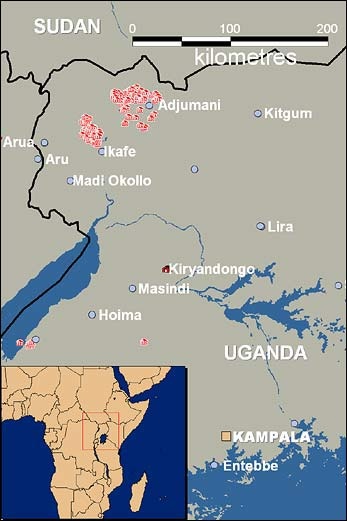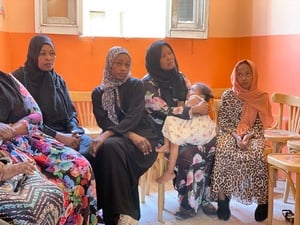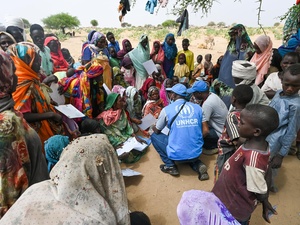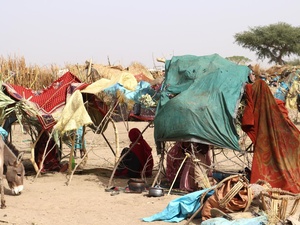Sudanese refugees in Uganda arrive in new home after rocky start
Sudanese refugees in Uganda arrive in new home after rocky start

Sudanese refugees at Kiryandongo camp resisting relocation to the West Nile region in Uganda.
KIRYANDONGO, Uganda, Sept 2 (UNHCR) - A first group of Sudanese refugees to move from an overcrowded camp in central Uganda arrived today in their new home in the north after a difficult start to the relocation operation.
On Tuesday, 19 trucks reached the Madi Okollo site in northern Uganda's Arua district with the first of some 15,000 Sudanese refugees from Kiryandongo camp in the central Masindi district. According to government sources, another 15 trucks have left Kiryandongo for Madi Okollo, bringing to 1,500 the number transferred so far.
The Ugandan government started the relocation on Monday. As the first group of refugees boarded the trucks in Kiryandongo at dawn, Sudanese refugee youth tried to bar other refugees from getting on. In the ensuing struggle, which included stone-throwing, seven refugees were injured, two of them seriously. Among the injured was an eight-year-old child.
By mid-afternoon Monday, calm had returned to the camp and Tuesday's transfer went smoothly, said government officials. The UN refugee agency has had no access to the camp since the start of the relocation operation.
Those affected by the move are refugees displaced from Achol-Pii refugee settlement (Kitgum district) in August 2002 following a series of vicious rebel attacks that left dozens of refugees dead and large numbers injured. When the displaced refugees arrived at Kiryandongo - already home to 13,000 Sudanese refugees - they stretched limited resources. Firewood, water, health and educational facilities were insufficient for all the refugees at the camp, hence the need for relocation.
The government of Uganda identified two new sites in the north's West Nile region, including Ikafe in Yumbe district. But many of the refugees protested against this choice, fearing rebel attacks by the Lord's Resistance Army.

During his trip to Kiryandongo camp in April this year, UN refugee agency chief Ruud Lubbers accepted the Ugandan government's decision on the condition that the authorities ensure the refugees' physical security.
"The commencement of the relocation will mark the beginning of a new life for the refugees in locations where security is guaranteed by the government of Uganda," said Juan Castro-Magluff, UNHCR's Acting Representative in Uganda. "Additionally, the refugees will be able to benefit from the self-reliance strategy which will make them self-sufficient in food production and render their lives more dignified."
The relocation operation is expected to be completed by mid-September. All logistics and security for the relocation exercise are being handled by the government of Uganda, while UNHCR staff are preparing the northern sites to accommodate the new arrivals.








